AS QUEENSLAND’S only commercial caper farmers, Mandy and Allan Evans are on to a winner.
Growing in the South Burnett region, west of the Sunshine Coast, their 65-hectare property has a Mediterranean climate, which means harvest is about double the length of time of southern growers.
The Evans’ rich, volcanic red soil produces capers, caperberries and leaves, which they value-add and sell under the Bunya Red Farm brand. Their pickled produce is in demand by top-end restaurants.
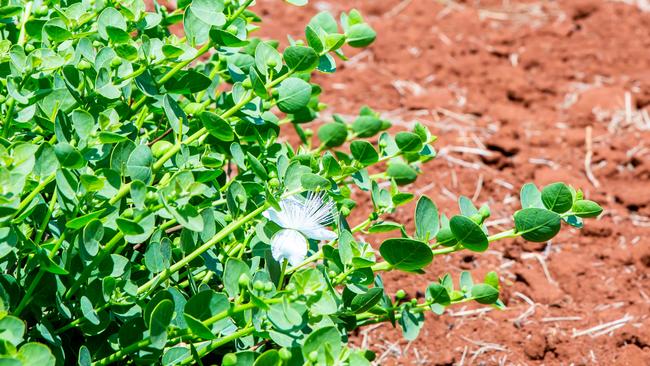
Having cornered the market in Queensland, they have taken home a swag of awards, most recently at the delicious Produce Awards.
So given it’s such a lucrative caper, why aren’t more Queenslanders farming the little jade gems?
“I don’t know, maybe they’re all too busy going to the beach,” says the straight-talking Mandy. “It’s a labour-intensive crop, so we’re the only ones silly enough to do it.
“But we seem to have found the winning formula about how to grow them in this region’s soil and everyone loves them. Whatever we’re doing with them is on the money.”
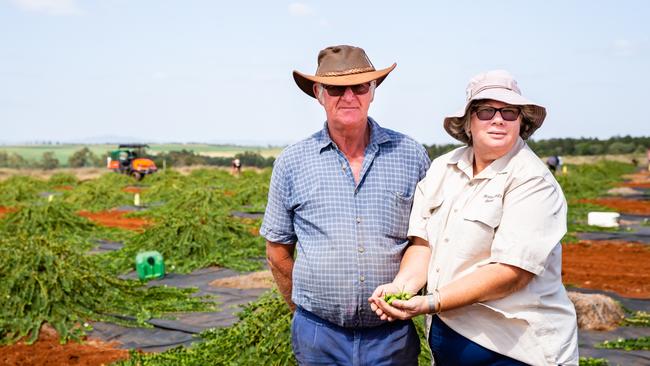
BUMPER PRODUCTION
Bunya Red Farm grows about 415 caper plants across one hectare, producing 3-5kg of capers per plant each season, with harvest running from September to April (compared to December to February in Victoria).
The plants were sourced from a South Australian breeder, who created the thornless Eureka variety, with the first 150 planted in November 2011 and the most recent 25 sown this year.
A WESTERN DISTRICT GROWER BREEDS RARE, UNUSUAL SEEDS
SOUTH AUSTRALIAN GROWERS BEAT THE HEAT WITH CAPERS
VICTORIAN PRODUCERS EARN HONOURS AT DELICIOUS PRODUCE AWARDS
Mandy adds value to the capers by salting them for about four weeks, then removing the salt and packing them into 50g or 100g packets ($16). She also packs others sizes on request from restaurants.
Caperberries are left in a brine solution of white wine vinegar for about a month, with the solution removed before being packed into 75g or 200g ($22) bags, or up to 2kg for restaurants.
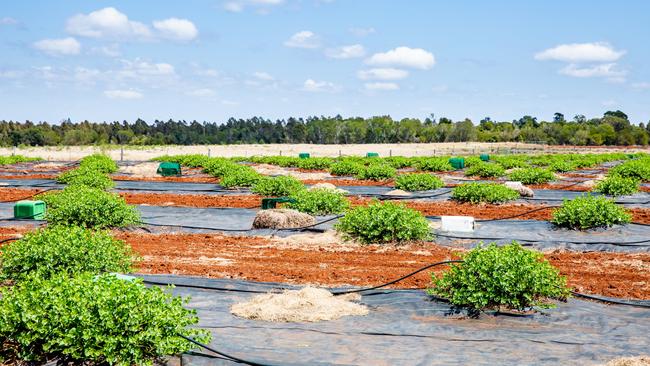
Any second-grade product is used for relish, dressings or pickle (with caperberries instead of gherkins); while salt used to cure the capers is sold to a Brisbane bakery, who make a caper sourdough.
Occasionally chefs request the young shoots and leaves, either fresh or preserved, which Mandy posts in the mail.
About 50 per cent of all products are sold to restaurants, 40 per cent through online sales or food festivals, and the remainder wholesale to food stores and delis.
In addition to the capers, the property grows about 18 hectares of peanuts, producing about 50 tonnes each season. The peanuts are harvested, processed at G Crumpton and Sons and then sold domestically.
The Evans also farm corn for cattle feed, although recent dry conditions have put this crop on hold. In addition there are a small herd of mixed cattle, alpacas and 10 guinea fowl to keep insects at bay.
EUREKA MOMENT
Both Allan, 62, and Mandy, 58, grew up on dairy, pig and cropping farms and vowed they would never become farmers and “go without”, opting for careers as a mechanic and in a bank respectively.
However, after their two daughters had grown up, a desire to move away from the “claustrophobia” of suburban Gympie saw the couple buy the 65-hectare farm in South Burnett, away from the “draining” humidity of other parts of Queensland.
“We also vowed never to live on red soil, because it stains everything, your feet, the bath mat, everything has a pink tinge, but I now miss it if I don’t see it. It’s highly fertile country, because of all the iron in the soil,” Mandy says.
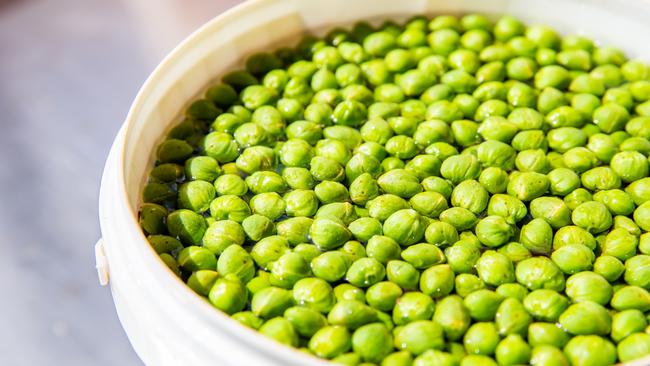
After watching an ABC Landline program about capers, the Evans decided to grow the perennial plant — which has a life span about 25 years — despite no one else in Queensland doing so.
“We didn’t want huge capital outlay for equipment and we didn’t want to work with agricultural animals,” Mandy says.
“You don’t need a degree to farm capers and you can work the hours to suit yourself.”
Given they had zero caper experience, their first 150 Eureka plants were grown in 14 test rows. Each row received a different organic fertiliser mix, including NatraMin Cal-S, Seamungus and alpaca poo, and one row with no inputs at all.
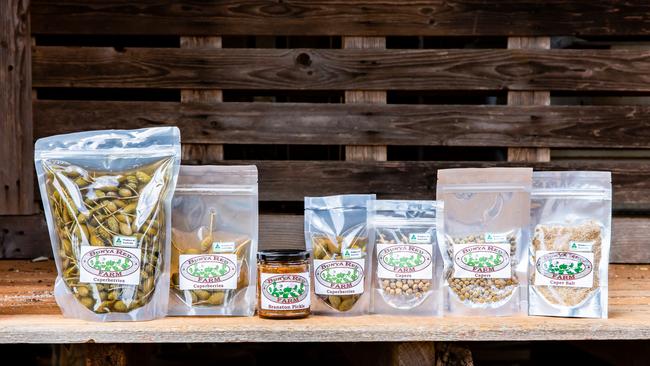
“By year three they were all growing exactly the same so we figured we would opt for low-input production.”
Since then, the Eureka variety has been planted out in autumn. Plants grow on mounded soil, as they “don’t like wet feet”, with spacings of 3.6m between plants.
Soil is ploughed and prepared with a mix of alpaca poo, lime and organic fertiliser.
Mandy adds they can’t be organically certified as their corn production occasionally requires synthetic sprays.
Polypipe provides gravity fed irrigation from tanks — from bore water — which also supplies fertigation requirements.
The plants are soil-tested regularly to ensure the right balance of nutrients, with the red soil at times deficient in boron.
Like other farmers in their state, the Evans experienced low rainfall last year, 590mm compared to 835mm the year before.
“Although if it doesn’t rain, the weeds don’t grow, which is great,” Mandy says.
Weed matting ensures most weeds are suppressed, with hand-weeding the only option for any that pop through.
The main threat to the caper plants comes from caper moth or white cabbage moth, for which they use an organic spray every three to seven days (more frequently if it rains), sprayed via a boom spray on a tractor. The guinea fowl work hard eating caterpillars.
Mandy says their farm is in the fruit fly zone, while other threats come from unpredictable weather in summer, with most of their crop wiped out on Boxing Day 2017 after a hailstorm.
Winters can plummet to -4C, and summers reach the mid-40s.
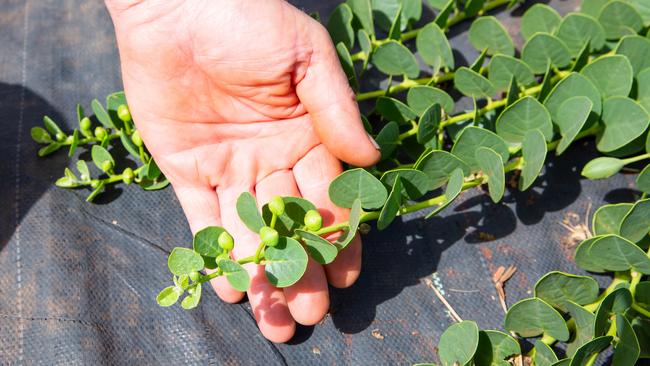
HELP AT HAND
Because harvest is done by hand, the Evans employ seven pickers, who work Monday, Thursday and Friday early in the morning or late in the afternoon to ensure the product is firm, because heat makes the capers soft.
Initially they pick capers from September to November and then in the festive season allow them to stay on the plant six weeks longer, when the flower becomes a caperberry after pollination. Then harvest continues as late as April.
“That means we can have a bit of time off over Christmas,” Mandy says. “It’s an easier lifestyle than dairy farming, for instance. If anything happens we can take time out, which makes it appealing.”
Once picked, the product is value-added in their certified commercial kitchen, built into a mobile food trailer, with recipes a “secret Allan-and-Mandy process”.
Remarkably neither Mandy nor Allan had ever eaten a caper before starting the farm in 2011.
“I was raised as a meat-and-three-veg girl, where we’d kill our own chook or cow,” Mandy says.
“I still find them a bit of an acquired taste. I come up with the recipe ideas and Allan is the taste tester. He eats the capers like beer nuts.
“We both love it because plants don’t care what you look like, or whether you’ve had a bad day, as long as you care for them, that’s all that matters.”
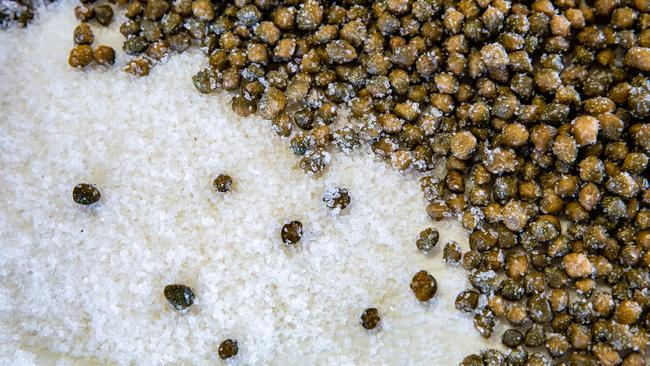
FARM FILE: Bunya Red Farm
Allan and Mandy Evans run Bunya Red Farm in Queensland’s South Burnett Region near the Sunshine Coast. The couple grows 415 plants and harvest capers, caperberries and leaves. They sell capers in salt, caperberries in brine and caper salt directly to the public and to restaurants.
Where: South Burnett, Queensland
More info: bunyaredfarm.com.au

Seaweed offers new wave of feed
Dairy cattle on a seafood diet? A seaweed supplement is making a big difference to methane outputs in Tasmania.
Quality, not quantity the key to success
When it comes to award-winning crops, plant health is everything, as these Kyabram brothers can attest.